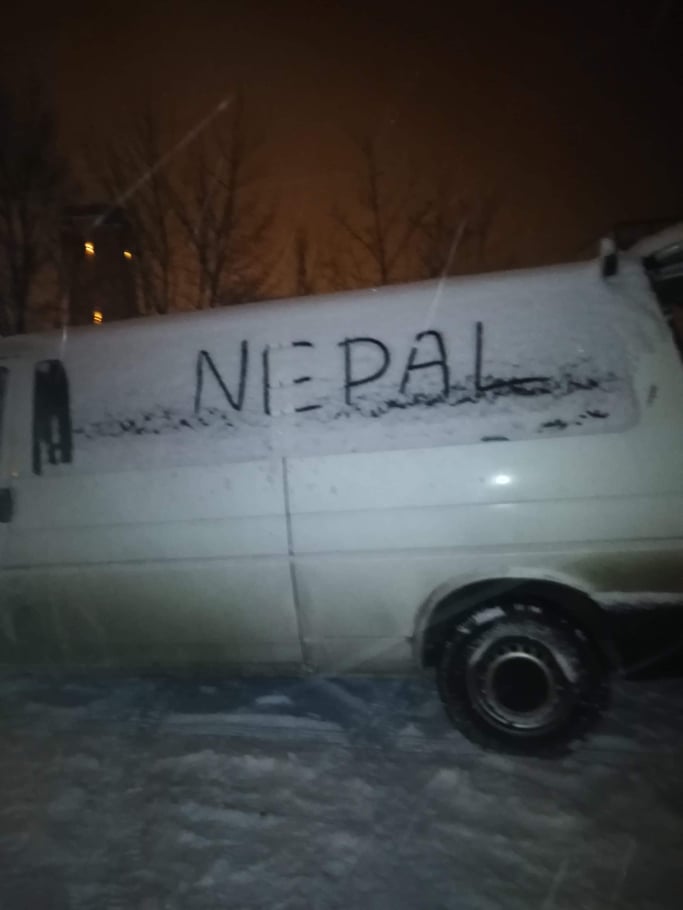Europe now favoured destination for Nepalis
Despite pandemic, workers lured by better earnings, benefits and chance at citizenship
Nepali emigration conjures up images of migrant workers at construction sites in the Gulf or security guards in Malaysia. Falling between the cracks are the increasing numbers of Nepalis now in Europe.
The volume of Nepalis going to Europe pales in comparison to migrant workers headed to West Asia or Malaysia annually, but their presence has been highlighted during the Covid-19 pandemic when many Nepalis fell sick.
Romania, for instance, issued 29,800 work permits to foreign workers in 2019, of these 4,324 were to Nepali workers -- the second highest nationality after Vietnam.
Similarly, in Poland, of the 69,000 work permits issued to Asian workers, 9,200 were granted to Nepalis who now make up the highest nationality. In 2019, the 2,273 Nepalis officially residing in Malta made them the fourth largest non-EU nationality on the Mediterranean island.
The Honorary Consul General of Nepal in Romania, Nawa Raj Pokharel, is one of the 500 plus Nepalis who has tested positive after the onset of the pandemic. He spoke to Nepali Times from his hospital bed on Tuesday.
“Workers in restaurants have been vulnerable to the economic fallout, but those working in warehousing, agriculture and construction have continued their work,” he said. “I have helped place workers who lost their jobs because of business shut-down or wanted to change employment with new employers. Unless workers are undocumented, they are eligible for unemployment benefits.”


A Nepali migrant worker in a park in Romania this summer, and a Nepali worker in a subway in Bucharest. In 2019, Romania issued 4,324 work permits to Nepalis, many of whom are now sick because of Covid-19.
A Nepali who spent two years in Qatar paid a recruiter Rs550,000 for a construction job in Romania. Although he was promised a monthly salary of up to Rs150,000, he barely makes Rs60,000 as a steel fixer at a construction site in Bucharest. Recently, he tested positive for Covid-19, and his medical expenses are being borne by his employer.
“At first, I thought it was just regular flu as my job requires me to work outside in the cold,” he told us on the phone. “Manpower companies in Nepal exaggerate earnings and made us falsely believe that access to other Western European countries will be easy once we are here.”
Another Nepali worker paid Rs450,000 for a job placement in Romania, and says he could not afford the recruitment cost for other Schengen countries which was up to four times higher. Although he is getting unemployment benefits, he is worried he cannot pay back the loan he took to pay recruitment cost.
He says: “My eventual dream is to make it to a Schengen country.”
Consul general Pokharel, however, says he advises Nepalis here not to try to cross over into Schengen area no matter how much agents try to lure them. “About a dozen Nepalis have been deported after they attempted to cross over on their way to Portugal, three of them recently,” he says. “They will be banned from entering any European country for the next five years. It is not worth it.”

In Poland, Rita works at a call centre servicing customers in the UK and US and is lucky to be able to work from home through the pandemic.
“I make less than what I made while working at a restaurant,” she says. “But I am significantly happier because the 12-14 hour shifts were physically taxing. Now, I feel more relaxed and am excited about my work.”
Ramesh works in a meatpacking company in Poland which closed down for three months this year during the pandemic. Luckily, he was provided 2,080 złoty ($555) a month to pay for rent and food. He says: “That is when I saw the merit in paying regular taxes and the benefits of having strong social protection.”
Most European countries are going through a second wave this winter, and cases have exceeded 16 million with 371,419 deaths. So far, Poland has seen 876,333 cases, Romania 422,852 cases, Malta 9,137, and Portugal 264,802 cases.

Unlike Romania, Poland is a transit country for many Nepalis who are headed into western Europe – most of them to Portugal given foreign workers can get residence and citizenship after five years. In fact, all roads in Europe seem to lead to Portugal, where there are now 16,849 Nepalis residing legally.
Twenty-year-old Hari is one of them, and he also spent nine months working as a mason in Poland first before moving on. His roommate, Manab, 23 year old Nepali paid Rs1.5 million to a recruiter to get him to the Czech Republic, spend a day there and headed out to Portugal where he believes there is a clear path to citizenship and a better future.
Officials records show that last year alone, 1,287 Nepalis acquired Portuguese citizenship – making them the ninth biggest nationality in the country.
The dream of a EU ‘red passport’ however comes with a price, many Nepalis have it difficult adjusting to the language, culture, and grueling hard work in a farm. The recruiter usually takes a cut, but there is not much they can do about it. Most Nepalis soon move on to Lisbon and other cities to work in restaurants and cafes. Because they are eligible for unemployment benefits, many have got 70% of their salaries for five months of the Covid-19 lockdown.
In March, Portugal decided to temporarily give migrants the facilities of full citizenship so they could access health and public service, a step which has received accolades globally. The country also temporarily regularised the status of 246,000 migrants till March 2021, among them some Nepalis.
With its mild climate and opportunities in the service sector, Malta is another destination for Nepali workers who want to use it as a stopover to western Europe. However, it is not as easy to obtain citizenship in Malta compared to Portugal.
Nepalis like Ram, who worked in a store in Valetta have received unemployment benefits during the pandemic. Nepalis working less than 100 hours a month are eligible to get €600 from the Maltese government.
“I am here just to earn and return home,” Ram told us over the phone. “My residence card allows me to visit other Schengen countries which is a bonus, but there many other Nepalis who are just waiting to secure a future in Europe for themselves and their families, and for them ease of obtaining citizenship plays a role in country selection.”

Ironically, Nepali workers in Romania, Portugal and Poland are filling in for nationals of those countries who have themselves migrated out. The Poland-Germany, Romania-Italy and Romania-Spain corridors are in the ten largest migration corridors globally, leading to significant worker shortages in these countries.
During the pandemic Romanians moved westward to fill worker shortages including via special agriculture worker chartered flights to the UK and Germany to pick fruits and vegetables. The worker shortage they leave behind is being filled by migrants from countries like Nepal who pay big recruitment costs for job placements, and whose ultimate dream destination also happens to be the same western European countries.
Nepalis took labour approvals to migrate to 127 countries in 2019/20, of which 94% was to the Gulf and Malaysia – most of these were intermediated by private recruiters. While 747 recruiters mobilised workers to Qatar and 497 to the UAE, the number of recruiters that placed Nepali workers to Poland, Portugal, Romania and Malta were only 66, 9, 14, and 9 respectively. (See chart)

“Compared to our traditional destination markets, the recruitment process for Europe is cumbersome and lengthy, while chances of visa rejection are also high for Schengen countries,” says Sujit Shrestha, General Secretary of the Nepal Association of Foreign Employment Agencies (NAFEA). “This has deterred recruiters. Workers have to travel to India for their visas, which further complicates the process and makes it costly.”
Non-Schengen visas for countries like Romania and Cyprus are almost guaranteed once the documentation is complete, but it takes months. The absence of Nepali missions in these destinations deters some employers as recruiting Nepalis requires mandatory demand verification from concerned missions.
Shrestha is coordinating with the Foreign Ministry and the Labour Ministry to diversify recruitment to higher earning countries with strong labour protection as a priority.
He says: “There is a good case to be made to simplify the process. There are significant employment opportunities in European countries that we can benefit from, but the procedural hurdles are too many.”

writer




